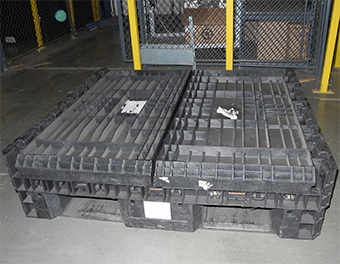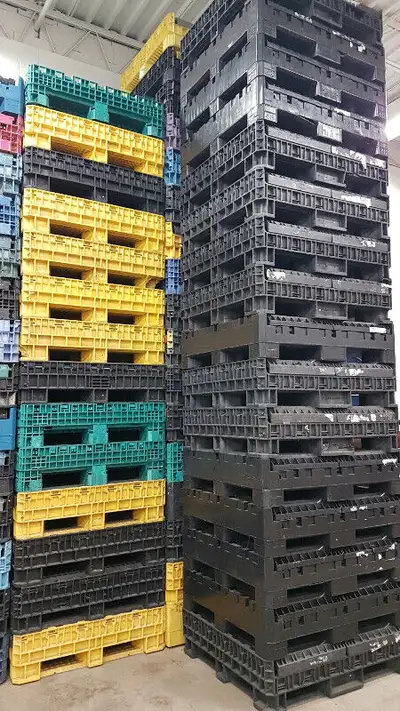Why Mass Containers Are Vital for Sustainable and Cost-Effective Transportation
Mass containers play a vital duty in contemporary logistics. They help with the reliable activity of huge quantities of goods, thereby enhancing transportation processes. This method not only minimizes expenses however additionally reduces ecological influence through reduced exhausts and waste generation. As industries look for more sustainable methods, the fostering of bulk containers is coming to be significantly significant. What implications does this change hold for future logistics and supply chain administration?

The Advantages of Utilizing Mass Containers in Logistics
Mass containers change logistics by boosting performance and sustainability. These containers allow for the transport of big quantities of goods in a single journey, markedly lowering the number of trips called for. This not only improves operations but likewise lessens labor prices related to handling, loading, and unloading. Furthermore, mass containers are made to optimize room utilization within transport cars, making certain that more items can be shipped simultaneously.
The standardization of bulk containers likewise simplifies the logistics procedure. With consistent dimensions, they can be easily piled and kept, causing improved warehouse monitoring. Bulk containers commonly include durable products that shield components from damages throughout transit, thereby lowering product loss and enhancing general dependability. Consequently, organizations can experience improved supply chain efficiency, inevitably resulting in raised profitability and customer contentment. This mix of variables makes bulk containers a crucial property in modern logistics.
Ecological Effect: Reducing Waste and Carbon Footprint
As industries progressively prioritize sustainability, the adoption of bulk containers has actually emerged as a crucial technique for lowering waste and lowering carbon impacts. These containers lessen making use of packaging materials, such as boxes and plastic, consequently significantly decreasing general waste generation. By combining shipments, mass containers boost transportation effectiveness, permitting even more products to be carried per journey. This decrease in trips directly correlates with lower greenhouse gas emissions, contributing to a smaller carbon impact.
Mass containers can frequently be recycled or reused, additionally minimizing environmental effect. The durability of these containers guarantees they can stand up to multiple transportation cycles, lowering the requirement for single-use options. used collapsible containers. By simplifying logistics and advertising efficient resource use, bulk containers not only sustain sustainable techniques however likewise motivate sectors to line up with global ecological goals. Ultimately, their application shows a dedication to ecological stewardship and responsible source monitoring
Price Financial Savings: Just How Mass Containers Lower Transportation Expenditures
While many companies seek means to improve their lower line, the usage of mass containers presents a considerable opportunity for lowering transport expenditures. Bulk containers make best use of the volume of goods transferred, allowing organizations to ship bigger amounts at the same time. This efficiency reduces the number of trips needed, straight lowering fuel expenses and decreasing labor costs connected with loading and dumping.
In addition, bulk containers typically feature structured styles that maximize area use within transport automobiles. This implies less voids, causing extra effective usage of offered capability. The longevity of bulk containers can decrease the risk of product damages throughout transit, minimizing losses and making certain that even more goods get here undamaged.
Enhancing Supply Chain Efficiency With Mass Storage Solutions
Mass storage space solutions play an important function in enhancing supply chain efficiency by optimizing stock management. By combining items into fewer, bigger containers, organizations can considerably minimize dealing with expenses connected with frequent transfers and processing. This streamlined strategy allows for better tracking and monitoring of supply, eventually leading to enhanced operational performance.
Streamlined Stock Administration
Efficient stock management is crucial for enhancing supply chain operations, specifically when organizations embrace bulk storage options. These remedies enable organizations to maintain higher supply levels while reducing the frequency of replenishment. By combining products right into mass containers, firms can streamline their inventory processes, decreasing the intricacy connected with tracking numerous smaller sized bundles. This technique facilitates exact inventory matters and improves forecasting precision, permitting even more informed decision-making. Furthermore, mass storage services streamline stockroom company, making it much easier to situate and access products when required. Consequently, companies can achieve a much more reliable stock turn over rate, eventually enhancing total supply chain efficiency and lowering the chance of stockouts or overstock circumstances.

Reduced Handling Prices
The application of mass storage solutions not just streamlines inventory administration however likewise significantly minimizes handling costs throughout the supply chain. By settling materials right into bulk containers, business reduce the need for constant handling and transfer in between various storage and transport devices. This approach cuts down on labor prices connected with loading, unloading, and relocating smaller plans. Furthermore, mass storage space minimizes the regularity of deliveries, leading to reduced transportation expenses and reduced gas intake. Therefore, organizations can enhance their logistics operations, enabling for a much more reliable appropriation of resources. Ultimately, lowered taking care of prices add to boosted overall supply chain performance, cultivating an atmosphere that sustains both sustainability and economic feasibility.

Flexibility of Bulk Containers Across Numerous Industries
Although several industries have unique requirements for transport and storage, mass containers have actually emerged as a versatile service that satisfies a large range of demands. These containers, varying from huge bins to specialized tanks, can suit diverse materials, consisting of fluids, granules, and powders. In the farming market, bulk containers help with the transport of grains and plant foods, while the food and drink market utilizes them for active ingredients and ended up products. The chemical sector counts on bulk containers for safely transporting hazardous materials, guaranteeing conformity with safety laws. In addition, construction firms take advantage of mass containers for transporting aggregates and other materials. Their adaptability encompasses numerous settings of transportation, consisting of trains, vehicles, and ships, enhancing logistical efficiency. This flexibility not just streamlines procedures across different markets however additionally advertises sustainability by minimizing product packaging waste and optimizing space in transit. Mass containers play a vital duty in contemporary supply chain management.
Future Fads wholesale Container Use and Sustainability
The future of mass container usage is significantly formed by ingenious materials growth that boosts sustainability. Additionally, automation in logistics assures to simplify procedures, reducing waste and improving performance. Welcoming circular economic situation practices will better revolutionize just how bulk containers are developed, made use of, and reused, fostering an extra sustainable transportation landscape.
Ingenious Products Development
As sectors progressively prioritize sustainability, ingenious products advancement wholesale containers arises as a substantial consider boosting green transportation services. Manufacturers and scientists are checking out eco-friendly plastics, recycled compounds, and lightweight steels to reduce environmental influence. These products not just reduce waste yet likewise enhance fuel efficiency by lowering the total weight of containers. Furthermore, improvements in wise products, which can adjust to varying problems, boost the resilience and capability of bulk containers. The assimilation of these ingenious products aligns with circular economic climate principles, advertising reuse and recycling. As the need for sustainable techniques expands, the development of such products will certainly play an essential role fit the future of mass container usage in logistics and transport.
Automation in Logistics
Significant innovations in automation are poised to change logistics and the use of mass containers, boosting sustainability in transport. Automated systems, consisting of drones and self-governing cars, are streamlining the motion of mass containers, decreasing the dependence on traditional fuel-powered transport. These innovations optimize transmitting and loading processes, improving and reducing vacant miles fuel effectiveness. In addition, automated stock administration systems boost monitoring and monitoring of mass containers, guaranteeing better resource allotment and decreased waste. The integration of the Net of Points (IoT) permits real-time data analysis, allowing aggressive decision-making that straightens with sustainability goals. As automation proceeds to advance, it is anticipated to drive better advancements wholesale container usage, eventually sustaining even more sustainable logistics techniques and lowering the environmental influence of transportation.
Round Economic Situation Practices
Improvements in automation are setting the phase for a much more integrated strategy to round useful site economic situation methods in the domain of bulk container use. As markets significantly welcome sustainability, mass containers are being designed for durability and reusability. This shift not just minimizes waste yet additionally improves resource used collapsible bulk containers performance. Business are taking on techniques such as closed-loop systems, where utilized containers are collected, refurbished, and reestablished into the supply chain. In addition, smart technologies track container life cycles, facilitating much better monitoring and reducing ecological influence. The partnership in between makers, logistics companies, and end-users is crucial in establishing criteria for sustainable container usage. used bulk containers. Future trends suggest a growing focus on materials that are recyclable and biodegradable, additional enhancing the circular economic situation's concepts in mass transportation

Regularly Asked Questions
What Materials Are Bulk Containers Typically Made From?
Bulk containers are typically created from sturdy materials such as high-density polyethylene, light weight aluminum, steel, and cardboard. These products supply adaptability, strength, and security, making them ideal for carrying various products in various industries efficiently.
Just how Do I Select the Right Dimension Bulk Container?
Selecting the appropriate size mass container includes examining the quantity of products to be transferred, taking into consideration taking care of equipment compatibility, and appraising storage area demands. Proper size assurances efficiency in transport and minimizes waste during delivery.
Are Bulk Containers Reusable or Recyclable?
Bulk containers are typically recyclable, designed for numerous journeys, boosting sustainability. Lots of can also be reused, depending on the materials utilized. Selecting recyclable choices even more supports environmental goals go and lowers waste in transport practices.
What Safety Laws Relate To Bulk Container Transport?
Safety laws for bulk container transport include compliance with the Department of Transportation guidelines, proper labeling of hazardous materials, structural honesty assessments, and adherence to weight restrictions to assure safe handling and stop accidents throughout transit.
Just How Can Companies Change to Making Use Of Bulk Containers Successfully?
Organizations can transform to bulk containers by assessing existing logistics, training team on handling, buying appropriate tools, maximizing stock management, and teaming up with vendors to assure compatibility and efficiency throughout the supply chain.
As markets progressively focus on sustainability, the fostering of bulk containers has emerged as a key method for lowering waste and lowering carbon impacts. By settling products into mass containers, firms can improve their stock processes, lowering the complexity linked with tracking several smaller sized packages. As industries increasingly focus on sustainability, cutting-edge products development in mass containers emerges as a considerable factor in improving environmentally friendly transport remedies. Automated systems, consisting of drones and independent cars, are enhancing the movement of bulk containers, minimizing the reliance on traditional fuel-powered transport. In addition, automated inventory monitoring systems improve tracking and surveillance of bulk containers, ensuring far better resource appropriation and reduced waste.